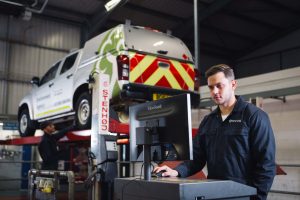With the pressures on public sector finances at an all-time high, we talk to Mark Benson, Emergency Services Fleet Consultant, at award winning fleet solutions provider, Rivus, about ways that critical public service fleets can maximise vehicle availability and fleet efficiencies to deliver significant cost savings, freeing up budget which can be redeployed to other areas within the organisation that require it the most.
“With public services under increasing pressure to deliver more services with less funding, the need for innovative solutions to generate cost savings and provide sustainable service improvements has never been greater.
“When it comes to the management of public sector fleets, procurement decisions can be weighted towards price. An example of this can be the north south divide in choice of vehicle manufacturers. If the capital cost of an asset is less, then this can deliver cost savings. However, this could be a false economy as the manufacturer may have a higher degree of vehicle off road time. As such, I would recommend a decision based on the whole life cost of the asset. This is where all elements such as fuel, insurance, tax, servicing and maintenance costs are included to ensure added value can be derived.
“Maximising vehicle availability by reducing off road time, lowering the costs of unscheduled events through preventative maintenance and finding other ways to increase in-house garage capacity at peak times can all create cost efficiencies that can be reinvested into newer, more efficient vehicles or staff training and recruitment.”
Is the public sector embracing the latest fleet management efficiencies?
“Efficiencies that could be considered a gold standard in outsourced fleet management such as strategic procurement, ensuring vehicles are fit for purpose and sourcing preventative maintenance solutions from a reliable partner, as well as avoiding running vehicles for longer than their shelf life could be adopted more widely within the public sector. Tender processes can often be structured to evaluate only the costs of running a fleet, rather than considering outsourcing as the tender scoring process is not set up to capture the wider value add.
“Take vehicle availability and measuring off road times as an example. Vehicle availability in critical fleets is circa 95% and is often reported as such through fleet management data. However, look more closely at the data and does this figure really take into account the time in garage, waiting time in a forecourt for a technician to become available or parts to arrive? Some service, maintenance and repair providers only measure vehicle off road time from when the vehicle goes onto the ramp, rather than taking account of the time the vehicle is sitting on site and waiting for parts to arrive or sat at dealerships waiting to be worked on.”
“Rivus consistently delivers industry leading Vehicle off Road (VoR) times for its customers, with an average of 97%-98%%, which can significantly increase with the adoption of our innovative Vehicle Check app. Rivus track VoRs rate from the time the vehicle arrives at one of its garages.
What is fleet outsourcing?
“A simple definition of fleet outsourcing is the handing over of the responsibility for managing vehicle service bookings, taking care of fleet administration such as parking fines, clean air zone charges and so on, vehicle service, maintenance and repair to an external party. Public sector organisations should consider outsourcing when there is potential for certain support functions to be completed more quickly, efficiently and cost effectively by an external specialist. Tasks that are not core competencies of the organisation are prime for being contracted out, so the fleet team can focus on operating the fleet.
What are the benefits of outsourcing fleet management?
“In short, substantial. From cost reduction, increased efficiency, expanded services to specialist expertise. Outsourcing potentially allows you to focus your resources on your core activities. But for it to be successful the decision needs to be an informed and collaborative one from procurement, fleet managers and the fleet management partner.
“Rivus is known as the experts in managing critical fleets and the biggest benefit for our customers is the consultancy, advice and guidance, drawing on our data driven approach, our extensive independently owned garage network and our expertise in capacity planning. This enables us to achieve optimum vehicle uptime and reduce unplanned or unscheduled maintenance events.”
Which elements of fleet provision can be ‘outsourced’?
Fleet management services can and will cover all aspects of an organisation’s fleet operations considering culture, objectives, cost and relationships. It is essential that you collaborate with your outsourced partner to build a fully bespoke response to your fleet needs – there is no one size fits all approach. We found this recently working with a government department who were keen to improve environmental credentials of their fleet yet had to consider the rural locations of its vehicles and access to garages.
We were able to work closely with then to understand the operational requirements of the fleet and propose a mobile service, maintenance and repair solution to maintain essential fleet vehicles out in the field (quite literally!).
Not everything lends itself to outsourcing but a blended approach with a trusted partner delivers a win for everyone, offering a centralised solution with modular services built in, which include a combination of the services below.”
Potential fleet management services for outsourcing:
| · Economic review and consultancy
· Supplier terms negotiation · Structure of maintenance policy · Supply and management of data · Automated invoicing · Reporting for key stakeholders · Management of existing suppliers · Duty of Care advice/management · Mileages capture · Integrated accident management
|
|
What other considerations need to be factored into outsourcing critical fleet management?
“Understanding how your fleet is currently performing and where there are areas for improvements are key to realising cost savings and efficiencies. It is essential to understand the total cost of operating and managing a fleet.
- Operational modelling and data analysis
“Outsourcing fleet arrangements to an external supplier must give your organisation access to improved service and added value, that would normally not be achieved through your current operation. These could include service or operational modelling, in-depth financial analysis to establish a per vehicle or lifetime cost to be able to compare and contrast services.
- Micro and macro cost considerations
“To ensure that the decision to outsource considers all factors, appropriate costing should be applied to both macro and micro levels of expense, from the cost of providing the vehicle provision and in life service, maintenance and repair, plus administrative and operational overheads.
“Macro costs include building rent, utilities, facilities management, security, postage, diagnostic equipment and tooling. Micro costs show how much day-to-day activities build up and are often not considered as a direct fleet expense, such as invoice handling, phone time, driver contact, booking and managing vehicle maintenance.
- Driver priority
“The entire customer experience should be based around the needs of the driver community, ensuring that employees receive prompt, simple and expert service and advice. Any problems should be addressed at the earliest possible opportunity to ensure that all main events involved in the life cycle of driver provision present no escalation points to the organisation, effectively removing all operational input, apart from any actions strategic in nature.
- Mobilisation
“A highly important part of changing either method of supply or mode of supply is the process of transition from one source to another. This process can invariably cause frustrations and put organisations off making the change. However, partnering with an experienced provider you’ll be involved in developing a detailed an in-depth transition plan to make it as seamless as possible for the business units and the drivers involved.
- Implementation
“Once a transition plan is in place, the partner organisations should work closely together to ensure a swift and smooth transition, paying particular attention to any potential risks that may be encountered such as resource availability, time pressures, agreement of contract terms – most of which would normally be ironed out through the collaborative tender process.
 “Rivus works closely with its customer teams on implementation and are adept at developing robust communication plans, transfer of undertakings through TUPE, supplier transition procedures and Duty of Care legislation to keep colleagues safe and secure.
“Rivus works closely with its customer teams on implementation and are adept at developing robust communication plans, transfer of undertakings through TUPE, supplier transition procedures and Duty of Care legislation to keep colleagues safe and secure.
“We have earned a reputation in our industry as the experts in managing the UK’s most critical fleets, and following a rigorous, multi-lot, competitive tender process, which began in February 2022, Rivus has been appointed to take care of the Metropolitan Police Service’s prestigious fleet for a period of up to 10 years.
“With over 43,000 officers and staff, the Met is the UK’s largest police force. It has over 5,200 fleet assets on the roads in Greater London, travelling 52 million miles each year.
“Their vehicles are under significantly more strain than the average vehicle on the roads of London and require a specialist fleet provider with the expertise to keep the fleet capable, responsive and safe. The implementation process for the Met fleet to be outsourced to Rivus has been a 12-month collaborative process to achieve the best outcome all round.”
How can Rivus support the public sector with critical fleets?
“A key differentiator for Rivus has always been our independently owned garage network of 78 LCV and HGV garages that delivers industry-leading Vehicle off Road (VoR) times for our customers. The business manages over 120,000 vehicle assets and delivers over 500,000 SMR events through our network every year. We can help relieve some of the pressures that fleet operators are feeling, given current pressures on the UK’s external SMR garage network.
“The business has also worked hard to develop a data driven approach for our customers. Rivus Insights is an innovative analytics platform which helps customers drive efficiencies within their fleets and the new, proprietary Vehicle Check App from Rivus makes it easier for fleet customers to manage their compliance and safety responsibilities. This is particularly advantageous to any HGV fleets in the public sector as it is recognised by the DVSA for Earned Recognition and contributes to HGV fleet operators Operational Licence.
 “In addition, to support and inform customers on their journey to zero emission fleets, Rivus has an Alternative Fuels team that specialises in helping critical fleets with the decarbonisation transition This includes helping public sector fleets fully understand the true cost of transitioning to alternatively fuelled vehicles in their fleet operations.
“In addition, to support and inform customers on their journey to zero emission fleets, Rivus has an Alternative Fuels team that specialises in helping critical fleets with the decarbonisation transition This includes helping public sector fleets fully understand the true cost of transitioning to alternatively fuelled vehicles in their fleet operations.
“Our aim is to enable public sector organisations with critical fleets to concentrate on what they do best. For example, if an Ambulance trust has ambulances off the road due unforeseen circumstances, that ambulance is not on active duty and helping to save lives. We are committed to working proactively to assess the monetary impact of outsourcing considerations. We look to remove the daily noise that fleets can cause, allowing public sector organisations to operate at a more strategic level and not get caught up in the nuts and bolts!”
To find out how Rivus could work with you to increase your fleet efficiency and reduce fleet expenditure, contact us today: www.rivusgroup.co.uk







Recent Comments